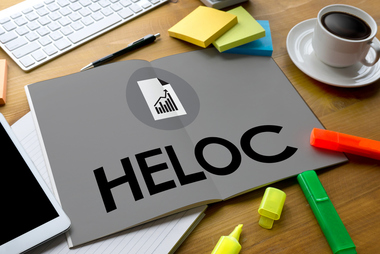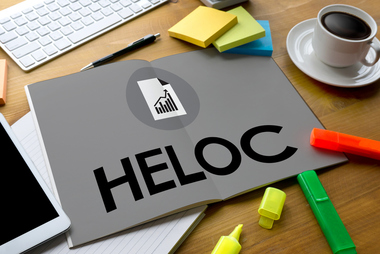One of the benefits of owning a home is the chance to build equity. Equity is the difference between what you owe on your mortgage and what your home is worth. If your home is worth $300,000 and you owe $100,000 on your mortgage, you have $200,000 of equity.
You can then borrow against that equity in the form of a home equity loan, or HELOC. A HELOC is a bit like a credit card with your home’s equity serving as your credit limit. Say you have $200,000 of equity. You might qualify for a HELOC of $150,000. You can then borrow up to that limit to spend the funds on whatever you want. And you only pay back what you borrow.
Say you need to spend $50,000 on a major kitchen renovation. You can borrow that $50,000 from your HELOC. You’ll then pay back what you borrowed in regular monthly payments, with interest.
HELOCs tend to come with lower interest rates than credit card s or personal loans do, which makes them a more affordable option when financing home repairs or renovations.
s or personal loans do, which makes them a more affordable option when financing home repairs or renovations.
Using your HELOC to fund improvements that will increase the value of your home is the best use of your HELOC dollars. You’ll even gain a tax benefit: You can write off the interest you pay on your HELOC if you use the funds for renovations or improvements that boost the value of your home.
What should NOT be financed with a HELOC
A dream vacation: You might want to fly to Europe or take that Alaskan cruise. But save up money to pay for it; don’t use your HELOC to fund it. If you fall behind on your HELOC payments, your lender can foreclose on you, eventually evicting you from your home and taking possession of it. Taking that risk to fund a vacation isn’t worth it.
Your or your children’s college education: Because the interest rates with HELOCs can be lower than what you’d get with private student loans, you might consider funding all or part of your or your children’s college tuition with a HELOC. Again, this is risky. If you stop making student loan payments, your credit score will tumble. But your lenders can’t take possession of your home. The same can’t be said if you stop making payments on a HELOC.
A big wedding: We get it: Weddings can be expensive. But again, funding a wedding — yours or one of your children’s — with a HELOC can put your home at risk. It’s not worth it for what is essentially a one-day event.
Stock market investments: You can make a lot of money by investing in the stock market. You can lose a lot, too. And if you use your HELOC to pay for your stock market investments? You might even lose your home if you fall behind on your payments. Again, the potential gain isn’t worth the risk. If you want to invest in the stock market, use your own funds that you’ve saved.
Credit card debt: This is a little trickier. Credit card debt comes with sky-high interest rates. It might make financial sense, then, to use a HELOC to pay off your credit card debt, as the interest rate attached to the money you’ve borrowed against your HELOC will be far lower. Again, though, there is risk. If you’re worried that you won’t be able to afford your HELOC payments, don’t borrow against your line of credit to pay off your credit card debt. Your credit card provider can’t foreclose on your home if you fall behind on your payments.


 Facebook
Facebook
 X
X
 Pinterest
Pinterest
 Copy Link
Copy Link
